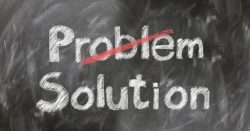 In last week’s post, we talked about the six types of pronouns. Pronouns can be pretty troublesome. This post will clear up some confusions about personal and reflexive/intensive pronouns, namely:
In last week’s post, we talked about the six types of pronouns. Pronouns can be pretty troublesome. This post will clear up some confusions about personal and reflexive/intensive pronouns, namely:
- Is it I or me? and the rest of those
- It is it’s or its?
- When do I use me, when do I use I, and when do I use myself?
Pronouns have “cases,” or different forms for different uses. Thank goodness English pronouns have only three cases; some languages have eight and have them for nouns as well; we really don’t.
- The nominative case is used for subjects. Those pronouns are I, we, you, he, she, they, and it. That is why we don’t say “Him and me went to the show.” Whoever is doing the action of the verb is the subject, and it usually (but not always) appears at or near the beginning of the sentence. He and I went to the show. She and I went to the show. She and they went to the show. However, note that after the “to be” verb (is, are, was, etc.), we use the nominative case as well. So it is correct to say, It is I or This is she, although it sounds a little stilted. So if you want to say, It’s me, I am not going to stop you.
- The objective case is used for objects. Those pronouns are me, you, him, her, it, us, and them. They come after the verb and sometimes after a preposition. I saw him. I made her a cake. I did it for them. I saw him and her. He gave it to Jim and me. Note that after a preposition such as by, for, to, with, and any other preposition, you use the objective case pronouns.
- The possessive case is obviously used for possession. Those pronouns are mine, yours, his, hers, ours, its, and theirs. (My, your, her, their, and your are usually used as adjectives, so I didn’t include them.) So if you ever forget whether to use its or it’s, remember that its is the possessive one. AND, like its, none of the possessive pronouns have an apostrophe (but possessive nouns do).
The reflexive pronouns have the same form as the intensives; it just depends on how they are used. They are the pronouns ending in -self or -selves: myself, ourselves, yourself, yourselves, herself, himself, itself, and themselves.
Intensive: (used for emphasis) I myself climbed that mountain. OR She climbed that mountain herself.
Reflexive: (refers back to the subject). I gave myself a manicure. She baked herself a birthday cake.
These pronouns are NOT used as subjects. These sentences are incorrect:
- He and myself built our house.
- Myself and my brothers took a cruise.
These pronouns, however, can be used as objects: direct, indirect, or object of a preposition:
- I saw myself in the mirror. (direct object)
- I gave myself a manicure. (indirect object; manicure is the direct object of gave.)
- I did it by myself. (object of the preposition by)
In all the correct sentences using the -self pronouns, what do you notice? Yup. If you use myself, the subject is I. If you use herself, the subject is she. The subject matches the object pronoun. If the -self pronoun doesn’t match the subject pronoun, you likely need to use the nominative or objective case, not the reflexive:
- NO: He saw my brother and myself walking down the street. YES: He saw my brother and me walking down the street.
- NO: She said her cousin and myself are the only people she could trust. YES: She said her cousin and I are the only people she can trust.
Please let me know if you have any other questions about these two types of pronouns. I think I covered it all. Next week, we will talk about interrogative and relative pronouns.



What kind of a pronoun is “one?” I’d think it would be a personal pronoun parallel with she/he/it. But I know that the possessive of “one” does take an apostrophe. Anomaly?
One, like anyone, no one, someone, and everyone, is an indefinite pronoun, so not an anomaly. The only personal pronouns are I, you, he, she it, we, and their plurals and possessives. One is nonspecific, thus indefinite.
“She said her cousin and me are the only people she can trust,” is, I think , incorrect. I believe that “her cousin and I” is correct. Following “said,” the word “that” is understood and introduces a noun clause. “Her cousin and I” are the subjects of the clause and, thus, in the nominative case.
Maybe this is old fashioned but it is what I was taught in my elementary school many years ago.
It is not old fashioned. It is absolutely correct. Did I give that example?? Yikes! I will fix.
Got it. I was in a military community for decades. I have a BA in English and communicating with staff (usually officers) the misuse of “self” was rampant.
It is still rampant everywhere, including the news on TV.
Even Prince Harry announced that ‘Meghan and myself have become parents’.
It may be the Queen’s English but her grandson has his own views on the subject
I think I remember hearing it. I guess the young ones in England don’t learn the Queen’s English either.
So often I hear educated people say “me and him” or “him and I” as subjects instead of “he and I.” It makes me wonder about the quality of teaching in school.
I agree. As a former English teacher, I certainly tried! I think many people forget what they learned in school, but you would think they would remember this one. It is so basic!